Testimonial
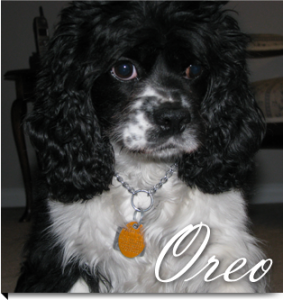
Our American Cocker Spaniel Oreo, was diagnosed with Progressive Retinal Atrophy (PRA) in early February 2012 at the age of 6 years. I happened to be with her when she lost the sight in her left eye and an immediate trip to the vet brought a diagnosis of PRA. We were advised that she was blind in her left eye and that there was noticeable degeneration of the blood vessels in her right eye. I immediately researched PRA online and discovered the Ocu-GLO Rx™ vision supplement, which Oreo began taking by the end of February. In May 2012, we noticed that Oreo’s blind eye appeared to be completely dilated all the time and had stopped reacting to light. If she sat in bright sunlight, the upper and lower lids of her right eye would narrow while the left eye remained completely unaffected – so it frequently drew our attention to the blind eye.
In June 2012, at Oreo’s annual check-up, the vet was surprised that the blood vessels in Oreo’s right eye seemed relatively healthy. Much to our surprise, in July 2012, we noticed that Oreo’s blind eye had started reacting to light again. Not only is the pupil of the blind eye now reacting to bright light (although not to the same degree as the eye with vision), the lids of both eyes now seem to narrow equally in bright light! We gather that Oreo’s night vision is somewhat limited as she will no longer venture past the lighted area in our back yard after dark, but she still seems to be able to see quite well in low light.
When first I researched PRA I learned that “the time frame until a dog goes blind varies considerably from dog to dog”, that all untreated dogs with PRA will eventually go blind and usually “complete blindness occurs within one year of diagnosis”. I gather that before Ocu-GLO Rx™, there was no treatment available for PRA. While Ocu-GLO Rx™ does not claim to prevent or to cure PRA, the literature I read states that usage of this antioxidant supplement may “help slow the deterioration of the retina to ‘buy some time’ visually”. While I believe it would be unrealistic to expect that Oreo will regain the vision in her blind eye, I am very encouraged by the fact that there appears to be some improvement in the retinal health of her good eye. One of Oreo’s favorite activities is to look out our front window and protect our home from the rabbits and squirrels that frequent our front yard. Oreo has been receiving the supplements for 5 months now and I am very pleased with results to date. I am hoping that through the continued use of Ocu-GLO Rx™, she may maintain her eyesight for a couple more years and prolong her ability to chase balls and her animal-watching activities.
~ Alora S. and Oreo
Quito is a small gray Terrier cross, about 10 years old. His known history began in early December of 2011, when he was found abandoned in a cardboard box by the roadside in Surrey, B.C. He was then sheltered by the Surrey SPCA and given medical attention by a local veterinarian. Quito had several health issues. His teeth were in very poor condition and he had advanced cataracts, so he was blind. He was quite thin, weighing less than nine pounds, and was infested with fleas.
Marge and I were introduced to Quito’s story by an SPCA veterinarian during a check-up visit for Ford, our Husky/Shepherd cross. (Ford was also a rescue dog from there.). We took the little Terrier home in mid-December after our doctor removed 12 of his teeth, and Quito began to settle into his new home. His weight picked up, although he led a pretty inactive lifestyle due to his blindness. Through it all he seemed a happy creature and accepted his place in life.
In January of 2012, we looked into the possibility of cataract surgery to help Quito’s eyesight. Dr. McCalla in Bellingham, Washington put Quito through three assessment visits to check his suitability for surgery. He was found to have PRA (progressive retinal atrophy), which was the cause of his cataracts. Although Dr. McCalla told us that surgery would not fully restore his vision and that he might not have functional vision after surgery because his retinas were fairly damaged, we wanted Quito to have every chance of having at least some vision. Quito was first placed on Ocu-GLO Rx™ (Dr. McCalla said that he would need to be on this the rest of his life) to help his retinas and support his eye health in anticipation of surgery. On March 7, 2012, Quito had cataract surgery on both eyes and since then, has made steady progress on a path to life with vision. We knew Quito’s vision after surgery would not be very good, but Dr. McCalla believed there was a decent chance that he would have better vision with surgery than he did without surgery, and that if Quito stayed on Ocu-GLO Rx™ forever following surgery, he might retain enough vision to be useful for him.
Now, Quito is much more active–making his way all over the house, climbing on and off furniture, guarding the front door when the bell goes off, and watching the world go by when he is in the car. He has been on Ocu-GLO Rx™ and additional lutein supplementation, and Dr. McCalla is very encouraged by his progress. Quito has become playful and willing to go on walks, and we are now living with a happy dog that can see the world, where the world and his life were once darkness. We feel very good to be part of this experience for Quito. He completely deserves the life that he has today.

The first picture is Quito at Christmastime, shortly after we brought him home and prior to his cataract surgery. The second picture is Quito about three months after cataract surgery. His pupils now constrict much better in sunlight than they once did, which is a really good sign. He is such a happy dog!
~Barrie and Marge G. and Quito

The first picture is Quito at Christmastime, shortly after we brought him home and prior to his cataract surgery. The second picture is Quito about three months after cataract surgery. His pupils now constrict much better in sunlight than they once did, which is a really good sign. He is such a happy dog!
~Barrie and Marge G. and Quito
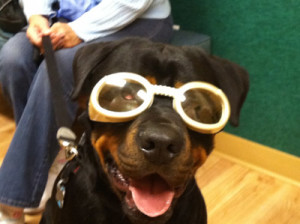
In July of 2011, I noticed that my dog, Porter, had watery eyes and his bottom eyelid was turning a pale color instead of black. I took him to Dr. Don Aupperlee in Ferndale Washington. He suggested that I see Dr. Terri McCalla at her ophthalmology practice in Bellingham, Washington. Porter was diagnosed with retinal degeneration in both eyes and spastic intermittent entropion (which means that his eyelids were turning in, but not all of the time). The hairs on the lids were irritating his eyes and causing his eyes to water. Porter was put on Ocu-GLO Rx™ to improve the health of his retinas, and an artificial tear ointment to lubricate his eyes. We first saw Dr. McCalla on July 21, 2011 and Porter’s eyes have changed dramatically for the better since then. The color in his lid has returned and he no longer squints. (Squinting seems to irritate his eyes and causes him to squint even more). Dr. McCalla said that his retinas look much healthier now. Porter also sees better at night! Of course, Porter does not like the idea that he can’t hang his head out the window when in the car, but as Dr. McCalla said, it’s not a dog’s privilege to hang his or her head out the window–it’s a choice the owner has provided. As good dog owners, we don’t want a bug or debris putting his eye out, causing an infection or triggering him to squint and roll in his eyelids again. However, we found a good solution to this problem – we bought Porter some Doggles! We are now training him to wear them when he’s in the car. It’s a little tricky and with his short brow, we must adjust them so they do not slide down, but he looks so cool. Thank you, Dr. McCalla, for creating Ocu-GLO Rx™ and caring for Porter – he is part of our family and we enjoy him so much.
~Pete and Candace G. and Porter
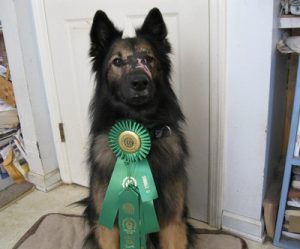
My Belgian Tervuren, Hokey, has been a bit jinxed in life. In September of 2009, he was diagnosed with an aggressive lymphoma. Chemotherapy seems to have dealt with that. Then in October of 2011, a nasal cancer (chondrosarcoma) showed up in the left side of his nose. Radiation was the only treatment and I was warned that his vision would suffer due to radiation scatter. By the end of his radiation treatments, pigment was growing across his left eye. Along with his eye medications (cyclopsorine and an antibiotic), I put him on Ocu-GLO Rx™, which I had used for my older dogs. I was told that medication might slow down or stop the progression, but that Hokey was likely to lose his vision. At his one-month check-up, the Cornell ophthamologist described it as almost miraculous. Hokey’s eye is perfectly normal and in fact, he passed his CERF exam (Canine Eye Registration Foundation). This past weekend, Hokey ran in Excellent agility at my club’s trials and earned his first Double Q! His face still needs to pigment in and grow hair from the radiation side effects but he can certainly see!
~Deb E. and Hokey
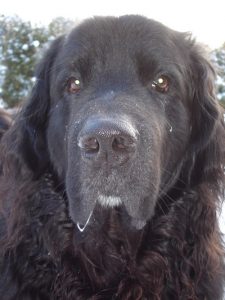
Buddy, our male Newfoundland, came to us as a rescue dog at approximately 1 year of age. He had been in three homes before we first decided to foster him as we searched for a new and permanent home. He was a 120-pound ball of anxiety. The first few weeks were very challenging, as he had not had much interaction with females and he was highly anxious that he was going to be dumped yet again. We fell in love with him and decided we would keep him and welcome him to our home. We had lost both our beloved dog and cat on the same day only a month before, and we were so grief-stricken that we swore we wanted no more pets. However, Buddy was a few doors down at a farm and it was quite apparent he was not a farm type of dog. So we fostered him and fell in love with him – we feel he rescued us far more than we ever did him. I am quite sure that previous owners got rid of him when they discovered he had PRA. A giant-breed blind dog probably would scare most people. We tackled his eyes as we have most of our health issues. After we consulted an animal ophthalmologist, we also consulted our naturopath and researched homeopathics, herbs and supplements, as well as began a very good diet. We were using human supplements. We also took care of Buddy’s emotional needs, which improved his overall health. By chance, I came across the website for Ocu-GLO Rx™. I was so excited to find a product that had been designed by experts in animal health and was meant for dogs. As animals absorb products differently than humans, I knew this had to be a much better fit for Buddy. We have been using the product for over six months and Buddy has healthy eyes, in spite of his PRA and cataracts. Our vet doesn’t understand how, but Buddy can see even though he has the big bright green glow from the PRA and the fog from the cataracts. He doesn’t get eye infections anymore and there is less brown ‘goo’ from the eyes. Although both of these conditions cannot be reversed, we feel hopeful that Ocu-GLO Rx™ is slowing the progression and at least allowing Buddy to enjoy the world through his eyes. In the end, Buddy rescued us in so many ways. It is now our job to keep this 160-pound Newfoundland healthy, happy and loved. It is a job that I love to do.
~Tracie S. and Buddy

We have had Taffy, our 10-year-old Queensland Heeler, on Ocu-GLO Rx™ for about two years. We were told when her PRA was diagnosed that she would lose her sight completely within a year. It’s been two years now and, although she can’t see at night, she still sees during the day and you would never know she has a problem with sight. It breaks our hearts to know that she can’t see during the night, but we know that if we don’t move things around or change her environment, she does very well. Thanks to Ocu-GLO Rx™, we truly believe that it has slowed down her PRA and, even if it only helps her see for a few extra months, it’s worth it to her and us. Update August 11, 2011: We have had Taffy on Ocu-GLO Rx™ for at least 3 years and during that time her vision has not diminished completely. We were told that after her diagnosis with PRD she would be blind within a year. Well, happily, she has kept some of her vision; enough to see to get around, eat and play. At night, she has problems seeing and bumps into many objects, but, during daylight hours, she gets around and even spots strange dogs trying to come in to her territory. It appears that she has problems with seeing things up close but has the ability to see dogs, people and cars in the distance. It’s possible that she is only seeing movement but, regardless, SHE SEES SOMETHING and for that we’re grateful. Thanks to Ocu-GLO Rx™, she has been able to keep some sight that may have been destroyed without it.
~Linda T. and Taffy

My 7-year-old English Cocker Spaniel, Darcy, first showed signs of his eyes not reacting to light in August of 2009. In April of 2010, Darcy was diagnosed with PRA and early stages of cataracts. The thought of Darcy losing his vision devastated me as I imagined how he would feel when his vision slowly deteriorated. He has been our little miracle boy and has been, and come through, a lot. The eye specialist recommended Ocu-GLO Rx™; I immediately visited their website and felt so much better and more positive after reading about the product and the testimonials. I was so excited that there was something on the market that could help Darcy. He was already on an allergy supplement and a multi-vitamin, and after reading the FAQs, I emailed Dr. Colitz to inquire about the dosage of Ocu-GLO Rx™ (to ensure he did not get too much vitamin E and grapeseed extract). Dr. Colitz responded promptly and advised me the best way to go. Since Darcy has been on Ocu-GLO Rx™, there does not seem to be any indication that his PRA and cataracts have progressed, and Darcy does not show any signs that his vision is deteriorating (touch wood!). In fact, he still sits on the top of the sofa, looking out the window, patiently waiting for people and dogs to walk by. Even at nighttime, he can see if someone is walking up/down the street or something is in the front yard. He runs around the house and our store, walks around an object if it’s in his way, can see right across the park when other dogs enter, and loves to hang out the car window (he always acknowledges when he sees a dog, person, cyclist, etc.). Additionally, Darcy suffers from dry eyes, but since he has been on Ocu-GLO Rx™ (I also give him a couple of eye drops per day as recommended by my vet), he is producing more tears and his nose is not so dry. My vet told me they had expected Darcy to lose his sight by now, as it has nearly been a year since his condition was detected. A huge thanks to everyone at Animal HealthQuest for developing Ocu-GLO Rx™ – you have given us (and Darcy, too) hope that this fantastic product will slow or even stop his cataracts and the progression of PRA.
~Michelle L. and Darcy

In the course of a single day in November of 2007, our Jack Russell Terrier, Maxx, went from having a slight eye squint in the afternoon to being virtually blind by 10 p.m. The emergency veterinarian told us that Maxx had glaucoma and we would be lucky if she wasn’t irreversibly blind by morning. Also, if she still had vision by morning, Maxx would need to see a veterinary ophthalmologist first thing the next day. Eight hours earlier, I didn’t know dogs could get glaucoma or that there were eye specialists for our furry family members. After two morning consultations with the ophthalmologist and hours of treatment, Maxx could see but her vision was in serious trouble. Within a couple of days, she had laser surgery to help control the glaucoma in her left eye. Six weeks later, Maxx’s left eye underwent additional surgery due to uncontrollable glaucoma. Instead of the eye being removed, an intraocular prosthesis was surgically placed inside the eye to improve the cosmetic appearance, and it looks great! Thankfully, her right eye was still visual. Maxx had routine recoveries from her surgeries and made a strong comeback throughout 2008. However, in late 2008, the glaucoma in her right eye was no longer controlled by medication, so we elected for Maxx to undergo endolaser surgery. This was performed by our wonderful ophthalmologist, Dr. Victoria Jones, with the assistance of her staff at Northwest Animal Eye Specialists, all of whom Maxx and we had come to trust and rely on to help keep her vision. Following her surgery, Dr. Jones (who knows one of the inventors of Ocu-GLO Rx™) recommended that Maxx start taking the predecessor to Ocu-GLO Rx™, a vision softchew treats that was available through a local compounding pharmacy until Ocu-GLO Rx™ GelCaps were available in December of 2009. Dr. Jones believed this supplement might help support Maxx’s recovery and her long-term eye health. As pet owners who embrace holistic veterinary care for our pets, we were excited to learn more and get Maxx on this special antioxidant supplement. A few months later, our other Jack Russell, Sophie, who is now 11, was having some trouble seeing in low light (called senile retinal degeneration). Dr. Jones suggested we begin Sophie on the supplement too. More than a year after her surgery, Maxx is doing very well and her glaucoma is under control. Both dogs’ vision remains strong due to their excellent ophthalmic care, Ocu-GLO Rx™ and a lot of love! In the photo, Sophie is on the left and Maxx is on the right.
~Lynne A., Maxx, and Sophie

We had a Dachshund/Chihuahua mix, Skipper, who had sequentially lost the lens in each eye and had poor corneal integrity, thus requiring multiple eye surgeries. We actually moved to the Bellingham, Washington area specifically because we wanted to live close to the highly recommended veterinary ophthalmologist, Dr. Terri McCalla. Right from the start, Dr. McCalla recommended Skipper take the vitamins and supplements that are in Ocu-GLO Rx™ (since the product was still in the development stage and not available yet). I searched high and low for pharmaceutical grade lutein, grapeseed, etc. – and realized they were next to impossible to find, not to mention how many different capsules I had to order online (and reorder at completely different intervals). Because Skipper was a small dog, the amounts he needed meant opening and trying to save partial capsules – while trying not to leave any on my hands lest I stain my clothes or the dishtowels. The supplementation made mealtime preparations lengthy and messy (and probably not terribly tasty for Skipper). However, our dear old boy lived to be 16-1/2 – and after six eye surgeries and the recommended vitamins and supplements that are now available in Ocu-GLO Rx™ – he could still see until his peaceful passing. We now have a second dog with eye problems; Sheila, a Greyhound/Rhodesian mix, has PRA. Her retinas are an absolute mess. I have started her on Ocu-GLO Rx™ and can’t believe how much easier it is! Sheila gets one capsule each meal and at bedtime, and all I have to do is buy one product (either online or from Dr. McCalla) instead of searching the Internet for multiple supplements from different manufacturers. The added beauty of it all is that Ocu-GLO Rx™ is pharmaceutical grade, so I know Sheila is getting the ingredients listed – something I couldn’t confirm in the supplements I ordered for Skipper. Ocu-GLO Rx™ is just a fantastic product that I highly recommend.
~Vanessa H., Skipper, and Sheila

For years, Dr. McCalla and I have wanted to place my sweet little Shih Tzu, Daisy Ann, on the canine vision supplement known as Ocu-GLO Rx™, but Daisy Ann needed something special— a small size GelCap – because she would not easily accept other forms of supplementation, no matter how hard I tried. Starting in December of 2009, Daisy Ann has been on the new small-dog-size GelCaps of Ocu-GLO Rx™ and she accepts it as just another piece of cheese from me. The small GelCap is perfect and I am so glad that Dr. McCalla and her research partners were able to make it in the small size. When I gave Daisy Ann antioxidant supplements in past years (buying several ingredients over the counter and cutting up the pills), the amounts I tried to give her were always a guess, even if she would accept some of them. But now, no more concerns about that! She is still on her doxycycline and a small amount of prednisone, but she is off all other medications now. I will keep Daisy Ann supplied with Ocu-GLO Rx™. Thanks again!
~Mary Ann A. and Daisy Ann
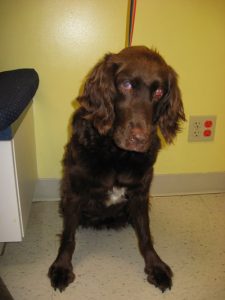
In October of 2009, my wonderful and sweet dog, Cocoa, was in a terrible accident and lost all of her vision in her right eye forever. Right after the accident, she still had fairly good vision in her left eye, but this quickly worsened due to severe inflammation of the optic nerve and retina. At Cocoa’s second eye examination, Dr. McCalla told me that Cocoa’s left eye was failing rapidly, having lost 90 percent of its vision. Steroid pills were not really helping, so Cocoa was put on the Ocu-GLO Rx™ supplement (in addition to doxycycline pills) in the hopes of saving the 10 percent vision she had left. The results were amazing! Cocoa has regained 50 percent vision in her left eye and she can now catch treats! Dr. McCalla says that it is hard to tell exactly how much of the recovery of vision is due to the doxycycline and how much is due to the Ocu-GLO Rx, but in her opinion Cocoa’s recovery of vision is a minor miracle. One thing is for sure: Cocoa will be on Ocu-GLO Rx™ for the rest of her life. Her recovery of vision is about the greatest thing, as Cocoa is my heart and I would do anything to help her. I think that with Dr. McCalla’s help, Cocoa will have a good life and we will be blessed to have her for many, many years. Thank you, Dr. McCalla, and Ocu-GLO Rx™! – From Cocoa Note: Cocoa’s right eye does not show any eye shine in this flash photo because of the severe damage to this eye.
~Mike and Cocoa

On a visit to our general veterinarian, we discovered that Abby had almost zero night vision. We had noticed that her day vision seemed to be declining as well. Our doctor suggested that it could be retinal degeneration and that it may simply be a factor of aging. Abby is 14 now, and this was several years ago. Yet, she is a Maltese and this breed can live to be 20 or older with great care and genetics. I decided to explore Abby’s eye condition further and made an appointment with Dr. Terri McCalla, a veterinarian specializing in ophthalmology. Dr. McCalla prescribed Ocu-GLO Rx™ for Abby. Abby’s day vision has not declined further even though she is now two years older. Dr. McCalla says that her retinas are in great condition, given Abby’s eye disease, and we expect that to continue.
~Madonna T. and Abby

My dog Pasco, a miniature Australian Shepherd, was diagnosed with PRA (progressive retinal atrophy) in 2008. He was 6 years old at the time. Secondary to this congenital eye disease, he also has cataracts. It is worse in his left blue eye than his right brown eye. Dr. McCalla explained that surgery would not be a viable option, and eye supplements would be the best course of action to help slow down the progression of the disease. It has now been over a year, and although his left eye had become a little cloudier, it has stopped now. Pasco still has great vision in his right eye. During the day, he is able to see everything. Although he sometimes has difficulties seeing in the dark, Pasco is not completely night-blind. It is sometimes difficult to know with certainty if a product/therapy is helping – especially with a pet family member, as sometimes the changes can be very subtle. There is also the difficulty in determining the outcome had the product/therapy not been used. Having said this, I do believe that for my dog, the Ocu-GLO Rx™ has made a difference by sustaining my dog’s vision given his circumstances. I am very thankful to Dr. McCalla and her research partners for the development of Ocu-GLO Rx™. It has made a difference in my dog’s life and he loves its great taste.
~Sandra H. and Pasco

Our sweet, loving and quite sassy dog, Pudge, came to join our family late in his life (he was 9 when we adopted him from the Whatcom Humane Society). Pudge had more medical concerns than one can keep track of, but he needed us. Over time, he proved we needed him, too! Dr. McCalla saved his sight. We cannot imagine how the loss of Pudge’s sight would affect all his other health issues, so we thank her for all she has done for our family. Pudge is proof that rescue dogs with many behavioral and health issues are still worthy of saving. Thank you, Dr McCalla, for all you have done!
~Angela & Jason L. and Pudge
Approximately 2-1/2 years ago, my Furbaby, Miko, was diagnosed with PRA (progressive retinal atrophy). Dr. McCalla suggested use of the Ocu-GLO Rx™. I know he will eventually go blind from this genetic disease; however, at our last eye exam, his eyes had not gotten worse – they are excellent!
I highly recommend using Ocu-GLO Rx™. If there is any chance of slowing the progression of vision loss, our Furbabies deserve this. Miko also suffers from epilepsy, hypothyroidism, dry eye and compromised liver function. Today though, he is still a happy, normal boy who loves life.
I thank Dr. McCalla for helping Miko live a normal life.
~Ms. N. and Miko
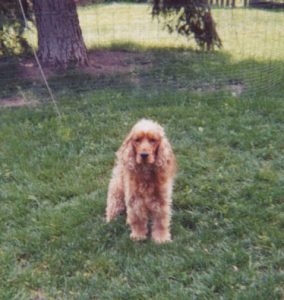
Cody is a red English Cocker Spaniel. He was 7 years old in March of 2009. He is one of three dogs in our family (two English Cocker Spaniels and one Sheltie). All three run in agility trials. Cody has severe food allergies. The only food his system can tolerate is Hills Z/D Ultra. We even have to use this food for treats. In October of 2008, Cody was diagnosed with PRA (progressive retinal atrophy). In December of 2008, the diagnosis was confirmed by his veterinary ophthalmologist, who consulted with Dr. Colitz and prescribed Ocu-GLO Rx™. Because of his allergies, we were more than a little concerned about giving him anything other than his food. However, he has had no problems with the GelCaps. Cody is due to see his veterinary ophthalmologist in December of 2009 for a check-up. Cody is still running in agility trials and has no problem with the jump heights or contacts. He is a very fast runner and often challenges the Border Collies in run time. Our Sheltie cannot keep up with him! A big thank you to all the wonderful and caring doctors and to your staff for giving us hope!
~Ms. K. and Cody
At the age of 5, Destiny was diagnosed with a retinal eye disease (progressive retinal atrophy). I was told she would be blind within 5 months. She is now 7-1/2 years old and can still see, thanks to Ocu-GLO Rx™. I am so thankful she was able to receive this supplement. We live in Yuma, Arizona now but I still give her one Ocu-GLO Rx™ GelCap each day and will continue to do so. Thank you so much!
~Sharon M. and Destiny
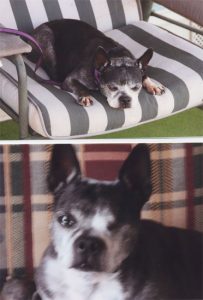
Grace is a 10-year-old Boston Terrier. She is a rescue from Kentucky, where she lived for 15 months until her owner died. When she came into rescue, she was being treated for pancreatic insufficiency. Because her medications were so expensive, I was not given an adoption fee. She was 18 months old when she came to live with me in Washington. Grace didn’t seem to respond well to her medications, and soon after I got her, with the advice of her veterinarian, she was taken off medications and did fine without them. Over a year ago, Dr. McCalla diagnosed Grace with a pre-glaucoma condition in one eye and a small cataract in the other. She was prescribed an eye-drop medication schedule for both eyes and began the first trial version of Ocu-GLO Rx™. Grace did not like the initial (soft) chewable form of the supplement and it was a big fight every day to give it to her. I had to cut it up into very small pieces and hide it in peanut butter or cream cheese, and it was very difficult and messy to give it to her. We both were relieved to be put on the study for the first GelCap version of Ocu-GLO Rx™. Grace took her GelCaps daily and her cataract grew only slightly while on them. When we were no longer able to get the trial capsules, I could not get her to take the soft chewables again. I tried putting them in tiny pieces of ham, cream cheese and peanut butter, but she always knew they were loaded and would spit them out. I couldn’t fight with her every day to put them down her throat, so have been waiting patiently until the GelCaps come out in November. Unfortunately, since the trial began, Grace was playing with a kitten and was scratched in the eye with glaucoma. After a heroic effort, she lost the eye. Therefore, it is vital that we keep her remaining eye with the cataract going as long as possible, and I am overjoyed that the GelCaps will once again be available to her! Grace has a new examination coming up soon, and my hope is that the cataract is still small. However, she has been showing signs of low vision. She often misses jumping onto the sofa and has not been playing with the other dogs as much. I am not sure if this is only because of poor depth perception from losing the other eye, or perhaps the cataract has grown enough to cloud vision. I am very grateful that Grace was included in this study, as I believe it did slow the growth of the cataract and keep her vision longer than she would have had without it. Perhaps this supplement can be developed for people, and be a blessing to those who have been diagnosed with cataracts.
~Ms. G. and Grace

My Toy Poodle, Nicole, seems to have some sight preservation when she is taking Ocu-GLO Rx™. This is definitely a plus!
~Ralph W. and Nicole

Amos, my lively and lovable 8-year-old Vizsla, was diagnosed with diabetes in December of 2007. After adjusting to the initial shock of twice daily insulin injections and then six more weeks to regulate his glucose levels and insulin dosage, we were referred to Dr. Carmen Colitz of the Animal Eye Specialty Clinic in West Palm Beach. Ignorant as I was, I was unaware that cataracts are a common complication of diabetes in dogs, and astonished to learn how quickly they can develop. My education came quickly. Dr. Colitz gave my treatment-weary Amos a gentle but thorough exam and determined he did, in fact, have small cataracts already forming in both eyes. She prescribed Ocu-GLO Rx™, which is rich in antioxidants like grapeseed extract, lutein and other nutrients that have demonstrated some success in reducing the formation of cataracts. Amos even likes the taste. We give them to him as a reward following his daily injections. Here’s the best part: so far, so good! I have continued to take Amos for exams at three- and six-month intervals, and to date – almost two years after his initial diagnosis – there has been no further development of his cataracts. My big, bouncing galoot of a dog continues to spot and point toward any bird foolish enough to land in our yard. (He even caught one a few weeks ago!) Ocu-GLO Rx™ is an eye treat/vitamin that deserves wide exposure. I’m grateful to be among those who can speak personally for its benefits.
~Jeanie B. and Amos
